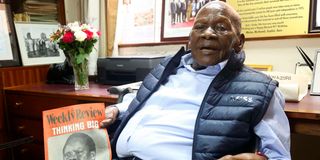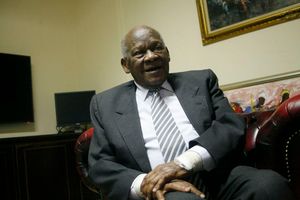
Former Cabinet Minister Maina Wanjigi holds a copy of the ‘Weekly Review’ during an interview at his Karen home on March 28, 2024.
His career began when Tom Mboya’s ended in 1969. But on Friday, the curtain fell on Maina Wanjigi, closing an illustrious chapter of the life of the politician who succeeded Mboya as Member of Parliament and became a confidant of presidents Jomo Kenyatta and Daniel Moi.
Mr Wanjigi, the father of businessman and politician Jimi Wanjigi, passed on at Nairobi Hospital at the age of 92 years.
Born on October 7, 1931, Mr Wanjigi studied at Kagumo Intermediate School up to 1946, then went to Alliance High School.
Thereafter, he proceeded to Makerere University in Uganda where he obtained a Diploma in Agriculture. He later qualified in agricultural economics and attained a master's degree in economics in the United States of America.
In his last media interview with the Nation on March 28 for an upcoming series, a jovial Mr Wanjigi narrated how tense his first encounter with Kenya’s founding President Mzee Kenyatta at State House, Nairobi, was.
He was a Director of Settlement then in the 1960s, and had no ambitions of joining politics.
Mr Wanjigi had spearheaded a million-acre scheme to settle landless Kenyans as well as provide dairy cattle for them.
President Kenyatta visited one of the farms in Timau and asked for 20 cattle. Mr Wanjigi told Mzee Kenyatta the cattle would cost Sh18,000, and he could not bend the rules.
“I would later be called to State House in Nairobi to pick the cheque. That was my first visit at State House as a very young officer,” the veteran politician said.
The former minister narrated how President Kenyatta directed then State House Comptroller Eliud Mathu to write him a Sh18,000 cheque. However, Mr Mathu “curiously omitted a comma between 18 and the three zeros.”
“Kenyatta was so angry, but I did not understand why. Kenyatta called him (Mathu) and told him furiously, ‘you want to steal my money’,” Mr Wanjigi told the Nation in an exclusive interview, which was yet to be published.
Mr Wanjigi said Mr Kenyatta must have sensed that the comma was omitted to insert one or more zeros in the figures so that he could pay more for the cattle.
Mr Wanjigi recalled how then Minister for Lands and Settlement Jackson Angaine had tried to persuade him not to bill the President for the cattle. But he stood his ground.
The Kenya Yearbook Volume II states that before Mr Wanjigi’s life turned around, he was an assistant agricultural extension officer being pushed around by unschooled senior colonial officers in Nyeri District.
The odds, however, turned in his favour as he became the first Director of Settlement in independent Kenya. He was responsible for settling thousands of landless Kenyans at a time when people held diametrically opposing opinions on how to deal with issues of land.
The Kenya Yearbook said his main task as director was to identify the land to be used for settlement and negotiate a buyout.
“To start with, I was a lecturer. I was not in politics. I was a very active churchgoer; I organised Church groups and the choir. I later became the first manager of the Industrial and Commercial Development Corporation (ICDC). At that time, I wasn’t thinking of joining politics because I felt that I had so much to contribute away from politics,” Mr Wanjigi said in his last interview with Nation at his Karen home.
In his book; Shepherd Boy in Pursuit of Virtue, Mr Wanjigi wrote: “Once the purchase had been concluded and titles transferred, I was then to oversee an orderly transfer of the land to landless Kenyans.”
Many former Mau Mau fighters were dissatisfied with the land transfer.
Mr Wanjigi was later appointed as the ICDC Chief Executive Officer with a mandate to integrate Kenyans in the industrialisation and commercial processes. His was to spearhead the Africanisation Programme in 1968.
Before the “independence decade” ended, the Kenya Yearbook said Mr Wanjigi left ICDC to contest in a by-election in Nairobi's Kamukunji Constituency following the assassination of Tom Mboya in 1969. He won the race and became the Kamukunji MP in November of the same year.

Former Cabinet minister Maina Wanjigi (right), his son Jimi Wanjigi (centre) during an interview with Nation Senior political Reporter Justus Ochieng' (left) at his Karen home, Nairobi on March 28, 2024.
At the time he joined politics, many children in the low-income Kamukunji Constituency could not access basic education.
Mr Wanjigi made a speech in Parliament in June 1973 advocating for free primary school education for all.
“Unless you have a good education which every child has access to and that can be harnessed to (enable them to) reach their full potential, you cannot build a sound population and a sound nation. It is about time somebody got the message that we want free primary education. Let every child in this country be entitled to at least eight years of free primary education,” the Kenya Yearbook states.
But it was not until 2003, during President Mwai Kibaki's regime, that free public primary school education was realised.
Gikomba Market
Mr Wanjigi took credit for initiating and developing the expansive open-air Gikomba Market in Kamkunji Constituency. Another project that he took pride in was helping to establish the Jua Kali (informal) business sector in Shauri Moyo.
And when President Kenyatta began another term in office in 1970, he appointed Mr Wanjigi as Assistant Minister for Agriculture under Minister Bruce Mackenzie.
In 1976 when there was a clamour to change the Constitution, an agitation believed to be aimed at denying the then Vice President Daniel Moi automatic ascension to power upon the death of Mzee Kenyatta, Mr Wanjigi was among a group of Mt Kenya politicians that stood with Mr Moi.
And when the coast finally cleared and Mr Moi took over in 1978 following the death of Mzee Kenyatta, Mr Wanjigi was one of the few ministers who were rewarded for their loyalty.
In December 1979, President Moi appointed him Chairman of Kenya Airways.
When rebel Kenya Air Force soldiers attempted at stage a coup to dethrone the Moi regime on August 1, 1982, Mr Wanjigi’s Bata Shoes distributor shop in River Road was looted in the ensuing melee.
And when Moi made changes in his Cabinet after the failed coup, Mr Wanjigi escaped the purge .
In yet another Cabinet reshuffle, President Moi moved Mr Wanjigi to the Ministry of Cooperative Development.
Working closely with Permanent Secretary Andrew Ligale, and Commissioner for Cooperatives Erastus Mureithi, he led the ministry in establishing savings and credit cooperative societies across all sectors countrywide in two years, according to the Kenya Yearbook.
Young professional
The Co-operative Bank of Kenya was launched when Mr Wanjigi was the Minister of Cooperative Development. He was then appointed Minister of Agriculture where he had cut his teeth as a young professional in the 1960s.
Mr Wanjigi said that key areas that appeared promising when he first worked in the ministry were grounded.
“Most of the institutions we had so painstakingly established had been run down. Research stations had been parcelled out to politically connected individuals and the entire programme of the Agricultural Development Corporation was no more as all the farms had been grabbed,” Mr Wanjigi said in his book .
While he on a tour of duty in Europe in May 1990, Nairobi City Council bulldozers descended on the expansive Muoroto slums in Kamujunji Constituency and demolished everything in sight, shattering the lives of its 2,000 residents.
An enraged Mr Wanjigi told journalists at the time that the Muoroto demolition reminded him of Operation Anvil during the colonial era. He condemned the raid as cruel and inhumane, and described those who had featured in it as stooges and neo-colonialists.
During the clamour for multi-party politics in 1990, Mr Wanjigi, having fallen out of favour with the powers that-be, was arrested, interrogated and held at the Lang’ata Police Station for three days before being taken to court. No charges were preferred against him.
For the first time, following the repeal of Section 2A of the Constitution in 1991, he found himself wading through the murky waters of opposition politics.
He joined Kenneth Matiba's Ford Asili faction of the original Forum for the Restoration of Democracy (Ford) party. He and others in the Opposition, the Yearbook said, tried to bring together Matiba’s and Jaramogi Oginga Odinga's Ford factions in order to defeat Kanu in the 1992 General Election.
When the grand plan failed, Mr Wanjigi in 1997 moved to his home turf. He bowed out of politics and focused on his business empire under the umbrella of Kwacha Group of Companies.







